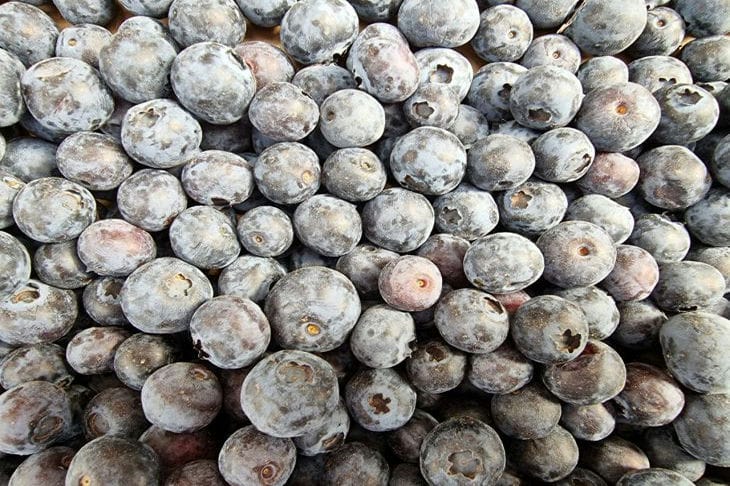How to feed blueberries to get large berries: secrets of a bountiful harvest
The taste of blueberries is known to all berry lovers. But how to ensure that the berries are not only sweet, but also large?
The success of growing blueberries largely depends on proper care and competent feeding. How to feed blueberries to get a bountiful harvest of large berries?
The Importance of Choosing the Right Soil
Before talking about fertilizing, it is important to mention the soil in which blueberries grow. This crop prefers acidic soil with a pH of 4.5-5.5.
If the acidity level is not adequate, it must be corrected using special preparations or natural remedies, such as sulfuric acid.
Maintaining the correct acidity level helps the plant better absorb nutrients from fertilizers.

Organic fertilizers for blueberries
Organic fertilizers play a key role in providing blueberries with the necessary nutrients.
Compost, rotted manure and peat moss are excellent options for this crop. Compost improves the structure of the soil, increasing its air permeability and water-holding capacity.
Well-rotted manure and peat moss also help improve the quality of the soil, making it more fertile.
Mineral fertilizers: the secret of large berries
Blueberries require balanced nutrition with mineral fertilizers. The health and fruiting of plants directly depend on balanced nutrition.
Nitrogen is the growth engine responsible for lush green mass.
Phosphorus is a root builder that stimulates abundant flowering and fruit formation.
Potassium is a protector and guarantor of quality, increasing immunity to diseases and improving the taste and size of berries.
Ammonium nitrate or urea are excellent sources of nitrogen. Superphosphate can be used to provide blueberries with phosphorus.
Potassium sulfate is the best option for potassium fertilizing. It is important to remember the dosages and not to exceed the recommended norms so as not to harm the plants.
Micronutrients for Health and Productivity
In addition to the main macronutrients, blueberries require micronutrients such as magnesium, iron, zinc, and boron. Magnesium deficiency causes yellowing of leaves, which negatively affects photosynthesis.
Iron plays an important role in the formation of chlorophyll, which is necessary for plants to perform photosynthesis. Zinc and boron, in turn, actively participate in the regulation of metabolic processes, ensuring healthy growth and development of plants.
Blueberries, like other plants, require a balanced complex of microelements for full growth and development. Complex fertilizers will help provide the plant with all the necessary nutrients in optimal proportions.
Fertilization: Basic Rules
Fertilizers should be applied during the growing season in several stages. The first feeding is in the spring, the second is when the ovaries are forming, and the third is during the period of berry filling. Fertilizers are distributed around the bushes, avoiding contact with leaves and stems to avoid burning.
Organic infusions for additional nutrition
Additionally, you can use infusions of organic materials such as nettles or chicken manure.
Nettle infusion is rich in nitrogen and microelements, stimulating growth and strengthening plants.
Chicken manure contains a large amount of phosphorus and potassium, which helps improve the quality of berries and increase their size.
Mulching: The Secret to Preserving Moisture and Nutrients
Mulching the soil around blueberry bushes helps retain moisture and prevent weed growth.
In addition, organic mulch, such as straw, pine needles or sawdust, gradually decomposes and enriches the soil with nutrients. This creates favorable conditions for the growth and development of blueberries, contributing to a large and high-quality harvest.
Regular watering for a stable harvest
Blueberries require regular watering, especially during the period of formation and filling of berries. Lack of moisture can lead to smaller berries and a decrease in quality.
It is optimal to use drip irrigation for uniform distribution of water and maintaining the required level of soil moisture.
Earlier we talked about protecting a site from flea beetles .
